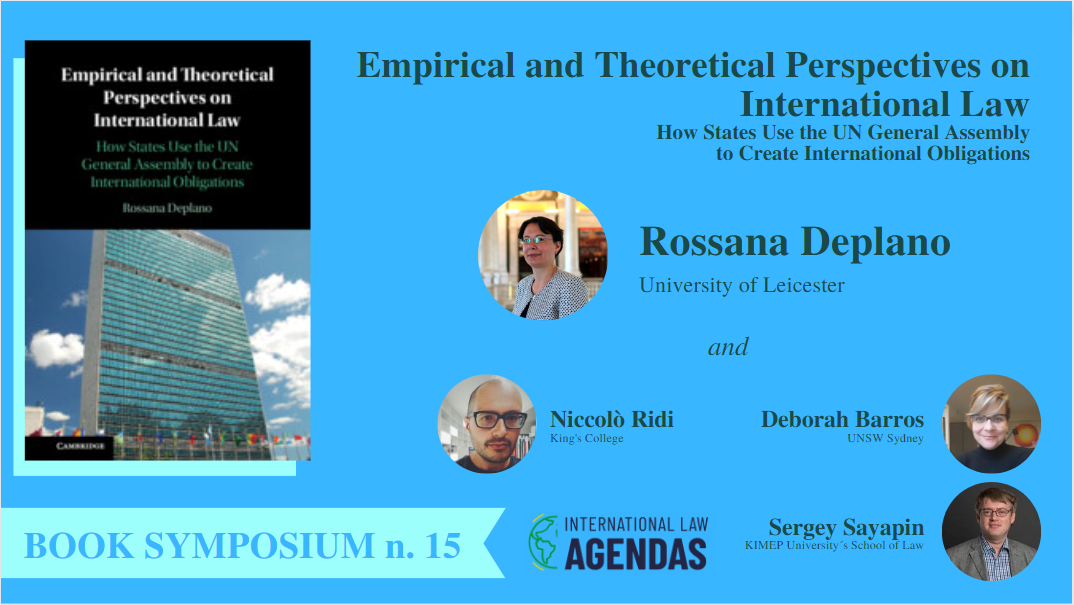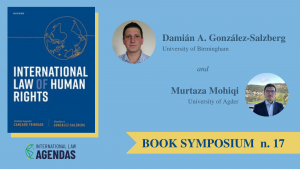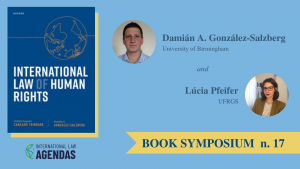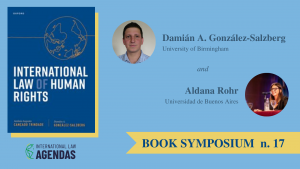I am extremely grateful to the Editors of International Law Agendas for hosting a Book Symposium on my monograph on the legal significance of UN General Assembly resolutions. I would also like to thank Professor Sayapin, Dr Barros and Dr Ridi for their generous comments and constructive criticism on some aspects of my work.
My response focuses on three areas of constructive criticism stemming from the reviews. They address aspects of the monograph relating to its scope, content, and form.
- Scope of the inquiry
I admit upfront that I wrote a monograph on the resolutions of the UN General Assembly out of genuine intellectual curiosity as to their legal significance and how to ascertain it. In my view, the General Assembly is a unique and fascinating institution: as the representative organ of an international organization with a universal mandate and (quasi-)universal membership, for all practical purposes it has the power to adopt recommendations for the international community as a whole. Such recommendations are often endowed with moral power, as they build on and reaffirm the foundational principles of international peace and security (including their human dimensions) enshrined in the UN Charter. I also wrote the monograph out of pleasure, since the inquiry into the legal significance of resolutions allowed me to venture into the world of empiricism. In doing so, I tried to bring the empirical analysis (both quantitative and qualitative) on an equal footing with the theoretical analysis of international law.
Performing empirical analysis requires research design choices that are by nature selective. Having before me a body of circa 20,000 resolutions, I had to select a fraction representative of methods of adoption (with or without a vote) and adopting body (the General Assembly in plenary session or one of its main committees). I have also decided to focus only on thematic, as opposed to country-specific, resolutions. The justification for this choice is that thematic resolutions address topics perceived to be of a general interest, hence they are likely to elicit the reaction of the international community as a whole. This perspective leads me to qualify the General Assembly essentially as a forum for discussion.
Professor Sayapin correctly points out that in challenging contexts such as those involving allegations of aggression and unlawful use of military force by UN member states, the General Assembly “is more than merely a forum for discussion”, especially when the Security Council is deadlocked. I agree with Professor Sayapin. I also think that different dynamics may be at play in the processes of attribution of legal significance to country-specific resolutions by states. This is an angle of inquiry worth pursuing, not only to provide a comparative assessment with the findings relating to thematic resolutions, but also to test the validity of one of the main findings of my work – namely, that generalizations about the degree of legal significance of resolutions are misleading.
- Content
Admittedly, combining empirical and theoretical analysis has been challenging. Doing empirical analysis is time-consuming. Compared to the pure theoretical analysis of international law, it also requires a different way of framing research questions and analysing primary sources (e.g. resolutions and the circumstances surrounding their adoption at the General Assembly). In the monograph, I essentially set one goal: understanding how and why states attribute legal significance to resolutions in various contexts. As a result, for every step of the inquiry I had to perform two different types of analysis – one empirical and one theoretical – with a view to putting the respective findings in dialogue with each other and draw insights from the combined analysis. (This dual mode is most noticeable in Chapter 2, where I examine the legal significance of resolutions at the time of adoption). Engaging in this type of research is extremely rewarding, as it generates novel findings. At the same time, it requires a more extensive line of reasoning affecting the length generally expected for a discrete piece of research.
Dr Ridi finds that a shortcoming of my book is the limited contribution it makes in the final chapter to broader debates, such as the problem of normativity in context of the study of international organizations. As he points out, connecting to broader debates would require “additional engagement with both analytical jurisprudence and constructivist international relations scholarships”. I acknowledge that what I have provided in the monograph is an “inward” conceptualisation of legal significance, as I have limited myself to an examination of the resolutions of the General Assembly. I could have certainly looked at the normative output of the representative organs of other international organizations and added a comparative layer to the analysis. At the same time, I do not think I would have been able to perform the comparative analysis within the acceptable length for a monograph by applying a combination of empirical and theoretical perspectives. Without a first-hand analysis of (a selection of) such normative outputs, I would not have been in control of the findings. Yet Dr Ridi’s suggestions offer a superb selection of food for thought for new research agendas, including those potentially building on or engaging with the findings of my monograph.
Despite the identified limitation, I am glad that overall, as Dr Barros points out, “[b]y highlighting the political life of resolutions before and after they come to life”, the monograph’s findings “are relevant for not just those interested in International Law but also International Relations”, especially constructivists interested in norms creation and diffusion.
- Form
Both Dr Ridi and Dr Barros suggest that the title of the monograph does not fully reflect its content. On the one hand, it could be perceived as suggesting that the monograph is about research methods. On the other hand, it does not disclose its relevance for academic fields other than international law, such as international relations or international organizations. I fully agree with both Dr Ridi and Dr Barros. This is not the title I originally submitted to the publisher. It was offered to me as a non-negotiable condition to sign the publishing agreement. I was equally told that, despite the book proposal being independently assessed by two anonymous reviewers as fully satisfactory (no revision required), the monograph could not be published in their International and Comparative Law series as “it is partly empirical”. Hopefully the ironies of the academic publishing world will not affect too much the expert assessment of my research endeavour by the informed reader! While I feel that certain research methodologies are still not fully integrated or accepted in many academic circles, I believe my monograph makes a small, but nonetheless important, contribution to the process of gradual pluralisation of international legal scholarship.
The experience I have accumulated while writing the monograph continues to inspire my scholarly imagination. As my research interests diversify and expand to new areas of international law, I keep coming back to the findings of my monograph as a springboard for new projects. My next research ambition is to contribute to the scholarly debate on the legality of space resource utilisation. The UN Committee on the Peaceful Uses of Outer Space (COPUOS) will submit a draft resolution on this topic to the UN General Assembly by 2027 for consideration and possible adoption. The draft resolution will elaborate on the provisions of the Outer Space Treaty (1967) regulating the use of outer space, including its resources, for peaceful purposes. As customary, COPUOS will adopt the draft resolution by consensus and so will the General Assembly should it decide to endorse it. Unavoidably, such developments on the ground will raise the question of what is the legal significance of a resolution adopted by consensus. In many respects, this is an empirical and theoretical question that can directly benefit from the research approaches and findings of my monograph.
-

Dr Rossana Deplano is Associate Professor and Co-Director of the Centre for European Law and Internationalisation (CELI) at the University of Leicester (UK).





